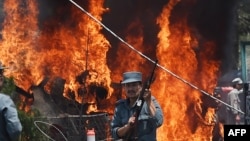Afghan President Ashraf Ghani is accusing Pakistan of fostering the recent spike in deadly insurgent attacks in Afghanistan. Islamabad is condemning this terrorist violence, and says it remains committed to helping Kabul end the violence.
Ghani’s criticism follows a series of attacks in Kabul during the past week, including Monday’s suicide car bombing near the city’s international airport. The violence has killed dozens of people and wounded hundreds more.
The Taliban has claimed responsibility for most of the attacks.
During televised remarks, Ghani alleged that Pakistan remains a “venue and ground” from which “messages of war” are being sent to Afghanistan.
The Afghan president said recent incidents show "the suicide training camps and the bomb-making facilities used to target and murder our innocent people still operate in Pakistan.”
After taking office nearly a year ago, Ghani set aside Kabul’s past differences with Islamabad to embark on a “new chapter” in bilateral relations. The two countries have since taken measures to improve security cooperation.
The recent Taliban attacks have provoked Ghani, however, to directly blame Pakistan for failing to rein in the insurgents.
The Taliban has stepped up attacks in Afghanistan, particularly after the acknowledgement two weeks ago that its longtime leader, Mullah Omar, is dead. The revelation halted a peace dialogue between the Afghan government and the Taliban, mediated by Pakistan.
Ghani now says he is abandoning the Pakistan-mediated process.
"The peace and reconciliation will be done by the state of Afghanistan alone, according to its own ways and mechanism,” he declared. “We do not want Pakistan to bring the Taliban to peace talks, but want Pakistan to stop activities on its soil of those who are waging the rebellion against Afghanistan."
In reply, a Pakistani foreign ministry spokesman said Pakistan has been “the biggest victim of terrorism itself, with human losses exceeding 60,000.”
He added, “The people and the government of Pakistan can feel the pain and anguish of the brotherly people and the government of Afghanistan."
The Pakistani spokesman said “terrorism is our common enemy and requires a cooperative approach to combat this menace.”





